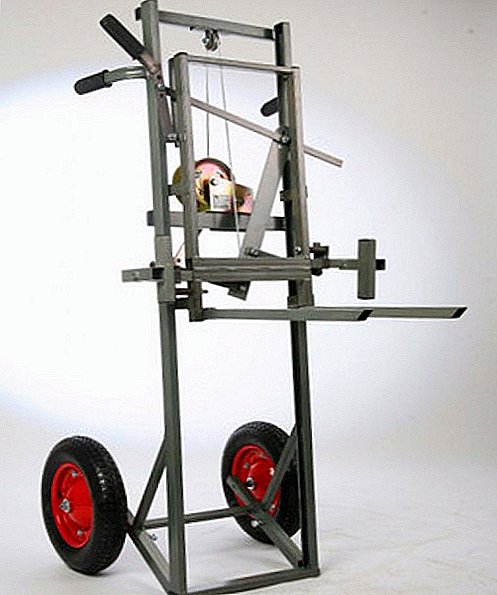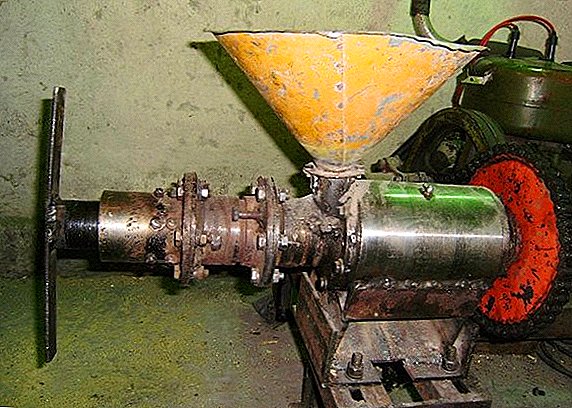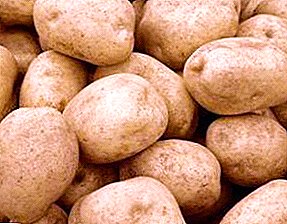 Tomatoes (or tomatoes) can decorate any table, adding to the dishes juiciness and freshness (large red berries are used not only in the preparation of salads, but also for various cold appetizers or casseroles). To choose a quality product that perfectly fits your requirements, you need to at least a little orient yourself in the plant varieties. Some of them are sweeter, others can be called sour, but each of them will have its own use. In this article we will talk about the variety "Budenovka" and find out how to properly perform planting, garter and collection of such tomatoes.
Tomatoes (or tomatoes) can decorate any table, adding to the dishes juiciness and freshness (large red berries are used not only in the preparation of salads, but also for various cold appetizers or casseroles). To choose a quality product that perfectly fits your requirements, you need to at least a little orient yourself in the plant varieties. Some of them are sweeter, others can be called sour, but each of them will have its own use. In this article we will talk about the variety "Budenovka" and find out how to properly perform planting, garter and collection of such tomatoes.
Features varieties "Budenovka"
"Budenovka" is a large-fruited medium-early tomato, the ripening period of which is 108-111 days from the moment of planting. Sometimes the plant reaches 150 cm in height.
 This variety of tomato has gained wide popularity due to its unpretentiousness to the conditions of cultivation and care, as well as a high level of resistance to late blight and other diseases. Tomatoes bring a very high yield and have excellent taste properties.
This variety of tomato has gained wide popularity due to its unpretentiousness to the conditions of cultivation and care, as well as a high level of resistance to late blight and other diseases. Tomatoes bring a very high yield and have excellent taste properties.
When describing this variety of tomatoes, it should be noted that the fruits are rather large and fleshy, weighing 0.2-0.4 kg each (in some cases it is possible to harvest tomatoes weighing 0.7 kg). They have a pink-red color, heart-shaped and sweetish taste.
Did you know? It was the shape of the tomato that contributed to its name, since it outwardly resembles the legendary Budenovka.
Tomatoes "Budenovka" can be used both fresh and canned, and in the summer season they are indispensable in salads.
To prepare tomatoes for the winter, you can use fruits of any size: small ones are closed whole, and large ones are processed into juice or tomato sauce.
How to pick and prepare seeds for sowing
 To collect the seeds choose a large healthy tomato (the most red and fleshy), which is fully ripe in the vine. However, if you miss this moment and pick all the fruits, they can ripen on the windowsill.
To collect the seeds choose a large healthy tomato (the most red and fleshy), which is fully ripe in the vine. However, if you miss this moment and pick all the fruits, they can ripen on the windowsill.
The seeds are removed from the tomato with the pulp, then placed in a glass container and 2/3 of the volume is filled with water. Then the jar or glass should be left in a warm place for 5-7 days. During this period, the fermentation process will take place in the tank, and after the indicated time has elapsed, the entire contents of the jar are well washed and dried.
Dry loose seeds are stored in an airtight glass container, which is filled to half its volume. In order not to get confused in varieties, you should stick a label with its name and date of collection of seeds.
When preparing seeds for planting, it is necessary to understand that only viable seedlings germinate well. For this reason, before sowing them into the ground, suitable samples should be selected and screened. Most often it is carried out in one of two ways:
 Manually, when very carefully inspect all the seed and visually determine the good and bad specimens.
Manually, when very carefully inspect all the seed and visually determine the good and bad specimens.
- With the help of common table salt: all prepared seedlings are placed in a 1.5% salt solution, after which they monitor which of them will sink to the bottom of the pot. The sprouted seeds are unsuitable for sowing, but those that were on the bottom are completely healthy and perfectly suited for the role of seed.
Important!Seeds with obvious signs of disease or differing from the rest in color or size should be immediately separated from healthy samples.
Growing your own seedlings
Tomatoes are grown in a rassadny way, but before being placed in the ground, they should be soaked in a weak solution of potassium permanganate (potassium permanganate). Preparation of seedlings begin when the soil temperature is not less than + 2 ° C (March-April). The process of sowing itself consists of two stages: soil preparation and the direct planting of seeds.
Interesting! Initially, the tomato variety "Budenovka" was bred precisely for growing in greenhouses.
Soil preparation for planting
 The soil for tomatoes begin to prepare in the fall. For these purposes, it is good to use green manure plants, which are also called “green fertilizers”. It would be nice to add organic and mineral fertilizers to the soil, loosen it and create the optimum level of humidity. These requirements also apply to soil preparation in the greenhouse.
The soil for tomatoes begin to prepare in the fall. For these purposes, it is good to use green manure plants, which are also called “green fertilizers”. It would be nice to add organic and mineral fertilizers to the soil, loosen it and create the optimum level of humidity. These requirements also apply to soil preparation in the greenhouse.
Today "Budenovka" is used for planting both in open ground and in protected soil, but without shelter it grows well only in regions with a fairly warm climate. In the middle lane, in order to get a full-fledged harvest, tomatoes are best grown to grow these tomatoes in greenhouse conditions. In open ground, the height of plant bushes reaches 1 m, and in greenhouses up to 1.5 m.
Scheme and depth of sowing seeds
 Once the ground is warm enough, you can start planting tomatoes. Seeds are buried in the ground by 0.5 cm, gently pressing the soil on top. The distance between neighboring seedlings should not be less than 15-20 cm. If the seedlings climb too tight, it can always be thinned when landing in the ground.
Once the ground is warm enough, you can start planting tomatoes. Seeds are buried in the ground by 0.5 cm, gently pressing the soil on top. The distance between neighboring seedlings should not be less than 15-20 cm. If the seedlings climb too tight, it can always be thinned when landing in the ground.
Important! Seeds sown 55-65 days before planting in the openth soil (usually it happens in the end of March - the beginning of April).
Planting seedlings in open ground
Transplantation of germinated plants to a new place (in a greenhouse or in an open ground) is performed at the stage of the appearance of the first brush with flowers. However, even in this case, planting of tomatoes is possible only after the last frosts have passed.
Usually, plants are planted at a distance of 30-40 cm from each other, sinking to a depth of 1.5-2 cm, although gardeners often follow the 60x35 cm scheme (distance between rows 60 cm, and 35 cm between plants in a row). To improve the composition of the soil and create more favorable conditions for future tomatoes, you can add superphosphate and humus to the soil. The first inflorescence of the planted plants is formed above the 9-11 leaf, and the gap between the remaining inflorescences is 3 leaves.

Caring for tomatoes in the process of growing
Cultivation of tomatoes "Budenovka" (low-length form) will not require excessive efforts from you, since the only labor-intensive process is the formation and tying of bushes, which is very important for greenhouse plants.
Even in not the most successful seasons, you can count on a high yield of tomatoes of this variety. (it is appreciated for its excellent “salad” qualities). For further growth and development of the bush, it is necessary to strengthen it in a timely manner (each bush is tied to the stakes driven into the ground).
Watering and feeding the soil
 The first time after you plant the seedlings in the ground, the plants need to be watered 2 times a week, but over time, the watering can be reduced to once in 7-10 days. In this case, only the lower part of the plant needs to be moistened, while the tops themselves do not like “baths” very much. After watering, you must immediately loosen the soil and remove the lower leaves.
The first time after you plant the seedlings in the ground, the plants need to be watered 2 times a week, but over time, the watering can be reduced to once in 7-10 days. In this case, only the lower part of the plant needs to be moistened, while the tops themselves do not like “baths” very much. After watering, you must immediately loosen the soil and remove the lower leaves.
If it is too hot outside, in order to avoid drying out of the soil, the bases of the bushes are covered with dried tops or hay. Budenovka requires moderate but regular watering, and during the flowering stage, the formation of ovaries and the subsequent formation of fruits should be increased.
No less important is the timely feeding of tomatoes. The main elements of full growth of tomato are phosphorus and potassium, which means that superphosphate or an egg shell extract is ideal for plants. The first feeding is done not earlier than 2 weeks after transplanting.
Important! Do not overuse mullein or nitrogen fertilizers, as tomatoes grow fat from them, forming many leaves and side shoots, while floral brushes appear much less.
Masking and hilling bushes
Pasony of tomatoes, including the described variety, involves breaking off (plucking) unnecessary stepsons (lateral shoots that grow from the leaf axils). Their absence contributes to the early ripening of fruits, since all the forces of the plant are spent on them.
 Due to hilling, which is performed in pairs in tomato varieties “Budenovka”, additional roots quickly appear in the plants, moisture is preserved and overheating of the root system is prevented in extreme heat. After hilling trunks, they are often sprinkled with hay or grass.
Due to hilling, which is performed in pairs in tomato varieties “Budenovka”, additional roots quickly appear in the plants, moisture is preserved and overheating of the root system is prevented in extreme heat. After hilling trunks, they are often sprinkled with hay or grass.
Garter plants
Variety "Budenovka" can be called a heavyweight, because of what he especially needs in the formation of bushes and garter. Thin and fragile stems often bend under the weight of the fruit or even break, therefore plant garter is one of the main processes at all stages of the crop ripening, which will require some effort from you. Pegs hammered into the ground are excellent for the role of support. Shrubs tie up as they grow, taking into account the maximum length of the tops of 1.5 meters.

Important! If the plant forked at the top, then each branch is tied to a support.
Harvesting
Some summer residents refer to the variety Budenovka as late-ripening tomatoes, since this process starts in mid-July. Fruiting lasts 2.5-3 months and ends with the onset of autumn.
A characteristic feature of these tomatoes is the so-called "ripening from the inside." Even if the tomato does not look ripe from the outside, inside it is fully ripe. Therefore, it is necessary to remove tomatoes from bushes in the phase of brown ripeness, which accelerates the ripening of the rest of the tomatoes.
 Greenhouse plants become ripe more quickly, but tomatoes planted in open ground require more time (usually these tomatoes begin to ripen only at the end of July).
Greenhouse plants become ripe more quickly, but tomatoes planted in open ground require more time (usually these tomatoes begin to ripen only at the end of July).
The average shrub yields from 4 to 5 kg of fruits, and due to its high resistance to the effects of phytophthora, they all grow healthy and strong. If you provide good care for the tomatoes, you will be able to get up to 7 kg of tomatoes per season from one bush. Interestingly, all the fruits of the variety "Budenovka" have almost the same size, with fleshy sweet pulp and a very small seed box.
Useful properties of tomato "Budenovka"
So, we found out that even unsuitable seemingly tomato varieties "Budenovka" can be eaten, since inside they are already ripe. These tomatoes are great for salads, and if you want to use them for juice or sauce, then leave the brown fruits for 2-3 days in a bright place.. During this time, they will acquire the usual red color and become softer. In addition, these tomatoes are great for preservation (it is better to select small fruits) or even freeze.
 This variety is very rich in vitamins and beneficial trace elements, but its main advantage is the absence of allergens. (even allergies can enjoy it without fear for their health). Fresh fruits contain a large amount of potassium, iron and magnesium. Continuous consumption of tomatoes of the Budenovka variety helps to reduce cholesterol in the blood, tune the gastrointestinal tract and normalize blood pressure, which has a positive effect on the general condition of the body.
This variety is very rich in vitamins and beneficial trace elements, but its main advantage is the absence of allergens. (even allergies can enjoy it without fear for their health). Fresh fruits contain a large amount of potassium, iron and magnesium. Continuous consumption of tomatoes of the Budenovka variety helps to reduce cholesterol in the blood, tune the gastrointestinal tract and normalize blood pressure, which has a positive effect on the general condition of the body.
With a little effort, you can enjoy a wonderful harvest of delicious fruits.


 Manually, when very carefully inspect all the seed and visually determine the good and bad specimens.
Manually, when very carefully inspect all the seed and visually determine the good and bad specimens.









